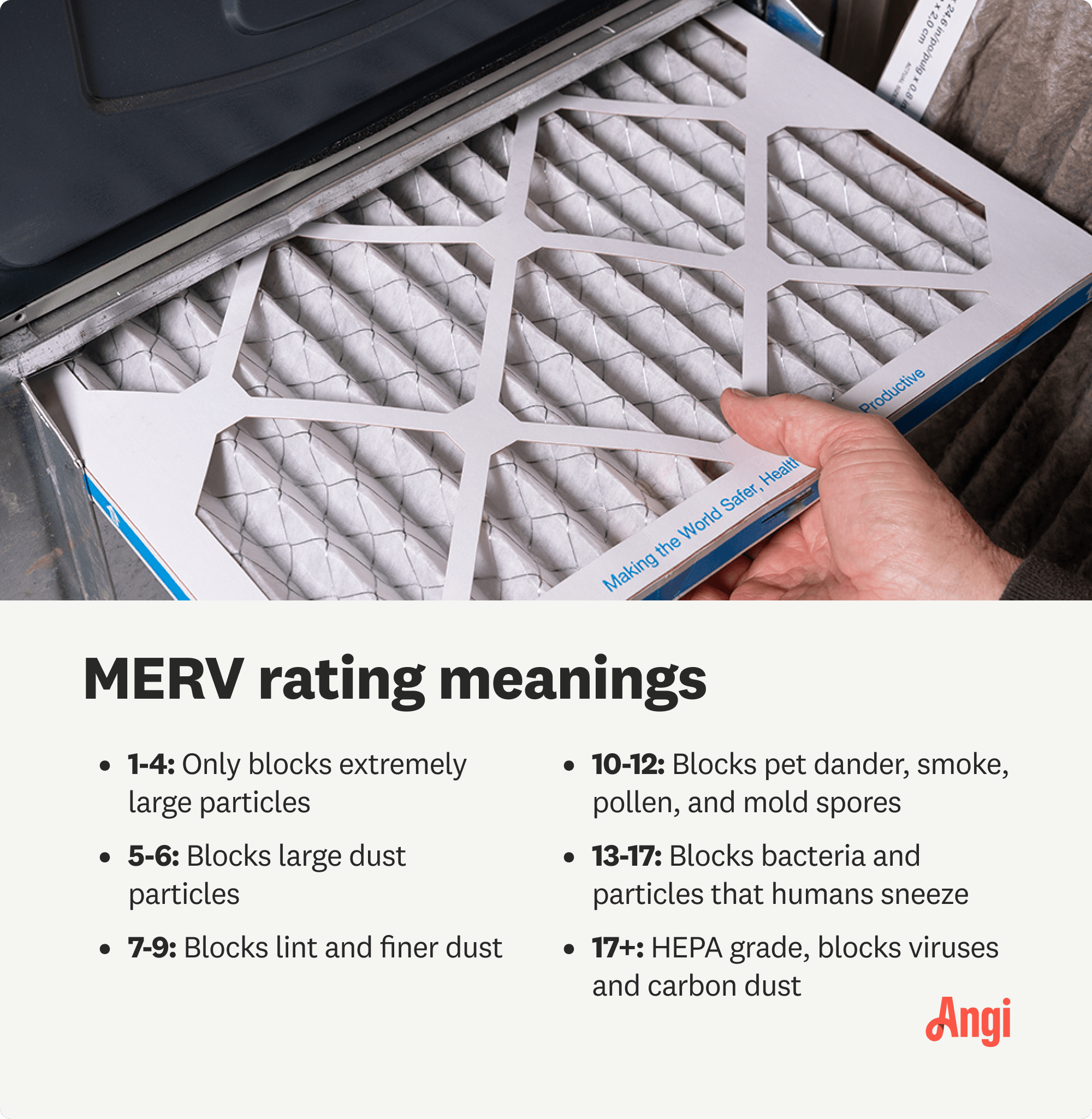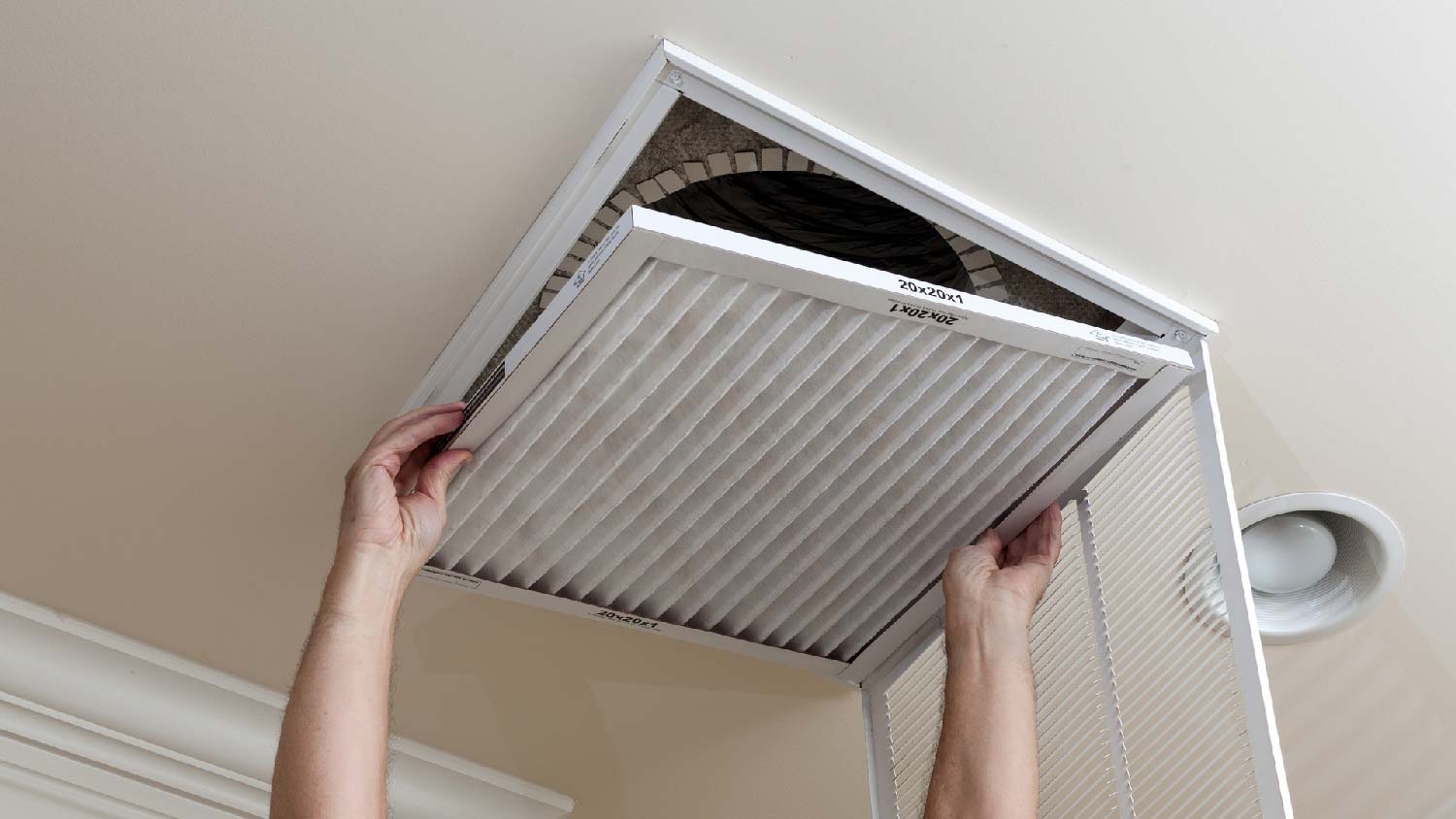
Explore how much an AC compressor costs to install based on cost factors like it’s type, brand, size, and local labor rates.
Better call MERV to keep those nasty allergens out


MERV ratings operate on a scale of 1 to 20, with 1 blocking out only large particles and 20 blocking out very fine particles.
Most households only need filters with a MERV rating of 6 to 8, but 11 to 13 is ideal if household members have severe allergies, respiratory diseases, or compromised immune systems.
Pets, smog, pollen, furnace age, and other factors determine which MERV rating is best for your HVAC setup.
The difference between 13 and 20 MERV ratings is minimal for household use, and MERV ratings above 13 cost more for minimal benefit.
Ever seen those numbers on air conditioner filters and wondered what they meant? Those are MERV ratings, which is a standardized scale used all over the world to score air filters. Scores are given based on how effectively the filters block particles, based on size, from circulating through the air in your home. Here’s what you need to know about MERV ratings on air filters and how they factor into choosing the best filter for your home’s HVAC system.
MERV stands for "Minimum Efficiency Reporting Value," and it rates an air filter’s ability to block particles of specific sizes from passing through. The MERV scale ranges from 1 to 20. A rating of 1 is the least effective (only blocks really large particles), and 20 is the most effective (blocks everything from large to really tiny particles).

A filter with a MERV rating of 1 can only block particles bigger than 10 microns, which is about the same size as a water droplet. In contrast, a MERV rating of 20 can filter out particles as small as 0.3 microns, which encompasses free-roaming viruses and carbon dust.
There are other rating systems for air filters, such as MPR (Microparticle Performance Rating) and FPR (Filter Performance Rating). While these alternate systems use similar criteria to MERV ratings to measure air filter efficiency, MERV ratings are superior because they are internationally standardized. If you purchase third-party air filters or move to another country, MERV ratings provide the same information about the filter’s particulate abilities across the board.
Which MERV rating is best for your home HVAC unit? This depends on several factors. For more specific advice based on your area and system, reach out to a local HVAC technician.
If your HVAC components are older, filters that can block ultra-fine particles can put too much strain on them and put your entire system out of commission. Furnaces predating the 1970s might require filters with a low MERV rating, such as inexpensive mesh filters.
The higher the MERV rating, the more expensive the filter is. While filters with a high MERV rating block out the most particles, they might not necessarily be the most cost-effective option for residential air filtering. The highest MERV ratings can block out the tiniest particles from yucking up your indoor air, but they also have to work harder at it and can raise your energy bills. If you have a lower home maintenance budget, choosing a filter with a rating closer to 6 or 8 might be your best bet.
Most people opt for a MERV rating of 8 to 13 to filter out a wider range of particles. Filters with a 12 to 13 MERV rating are ideal for household members with asthma, allergies, or other medical conditions that make them more sensitive to air quality. A filter with a range of 12 to 13 MERV is also ideal for homes with pets, especially if you have a long-haired or dander-prone furry friend.
Some areas of the country are prone to worse air quality than others. If you live somewhere that frequently sees less-than-ideal air quality and has lots of air pollution, like in bigger cities, getting an air filter with a MERV rating of 12 to 13 is a good idea.

Air filters that achieve a MERV rating of at least 17 are officially designated as HEPA, High-Efficiency Particulate Air Filters, by the U.S. Department of Energy. HEPA filters are capable of removing at least 99.97% of airborne particles larger than 0.3 microns, and there’s a very low chance that particles this size or smaller can pass through. HEPA filters for standalone air purifying devices may be more wallet-friendly than HVAC-level HEPA filters, which can cost $35 to $60 per filter, not counting the uptick in energy bills. You’ll also have to replace HEPA filters more frequently than lower-MERV-rating air filters.
Regular cleaning and maintenance are just as important as the filter grade. It won’t matter if your filter is capable of blocking out particles finer than micro glitter if you could’ve earned a college degree in the time between cleanings. Clean reusable air filters or replace disposable ones every one to three months, no matter the MERV rating. A local air conditioning repair company can assist you with finding the right filters for your household's needs and establish a maintenance plan based on the age and type of HVAC system you have.
From average costs to expert advice, get all the answers you need to get your job done.

Explore how much an AC compressor costs to install based on cost factors like it’s type, brand, size, and local labor rates.

A blower door test can identify air leaks in your home and help boost energy efficiency. Use this blower door test cost guide to see what your test will total.

Getting AC and furnace replacement done at the same time can lead to huge benefits for your wallet and your home. Here’s everything you need to know.

Your return air vent is responsible for removing warmer air, so testing it ensures you keep your environment comfortable and there are no HVAC problems.

When you notice hot and cold zones in your home, it pays to learn how to balance airflow in your ducts to even out the temperature.

You’ll need to get creative if you want to run your portable AC in a windowless room. Here’s how to vent a portable air conditioner without a window.